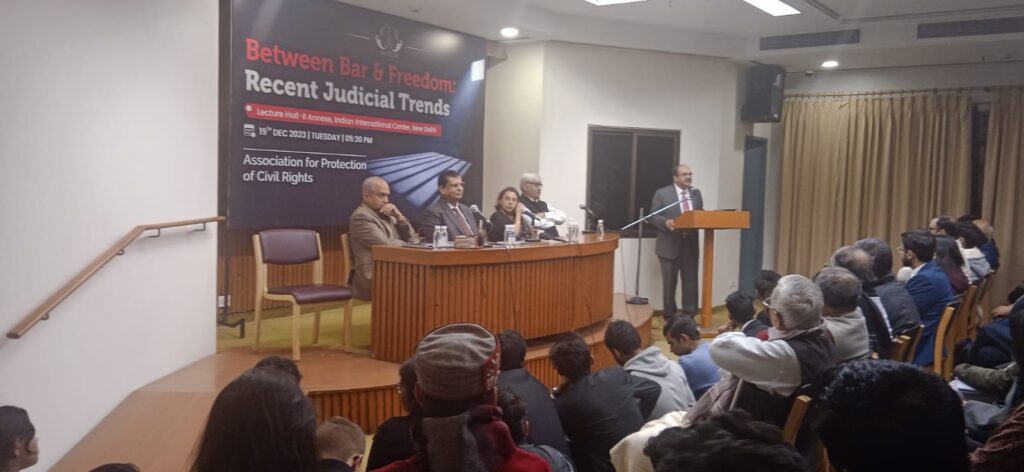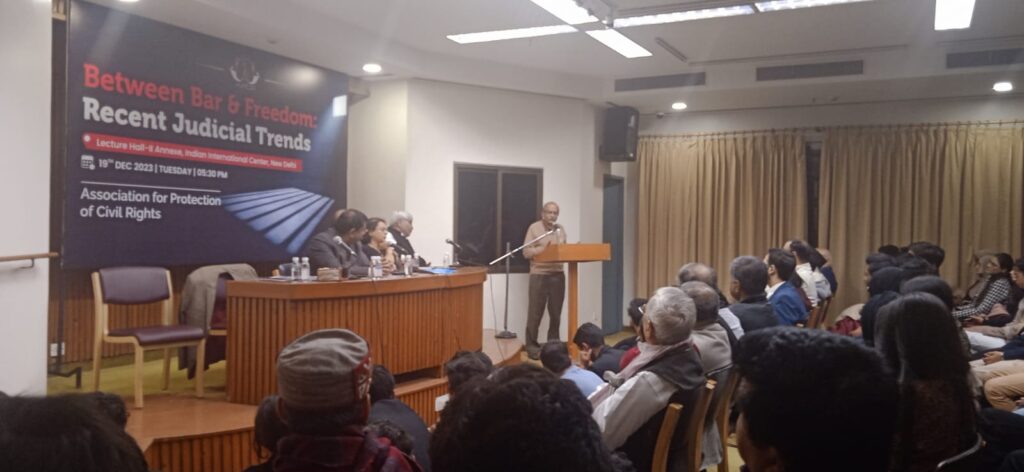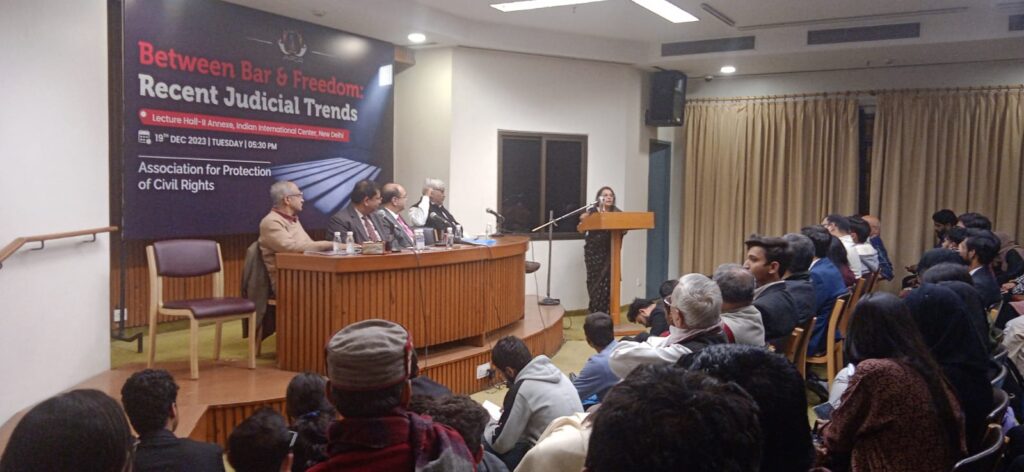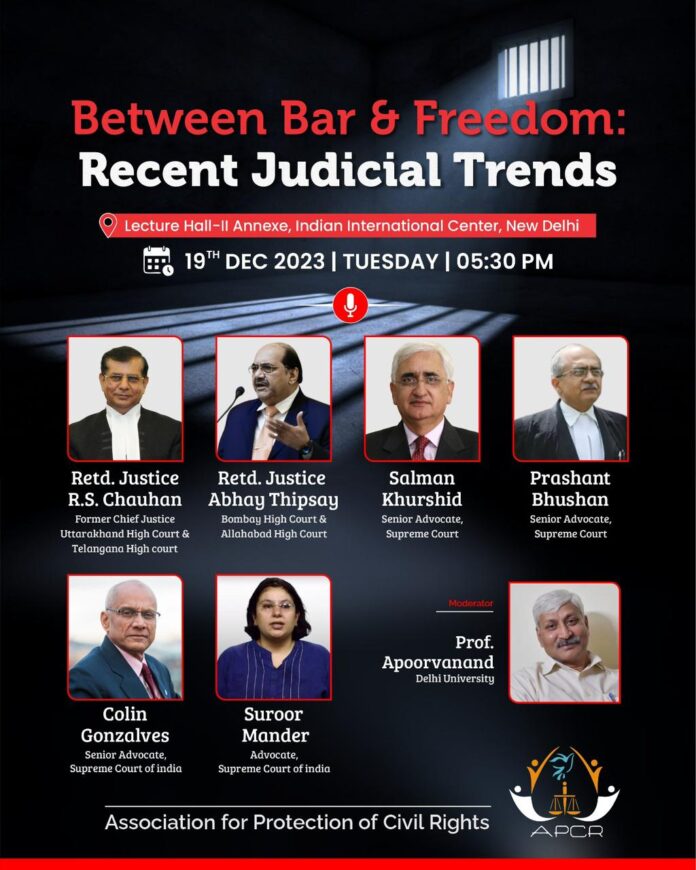By Anwarulhaq Baig
NEW DELHI—Amidst rising concerns over the government’s rushed attempt to pass criminal law bills replacing the IPC, CrPC, and Evidence Act while a large number of opposition MPs remain suspended, retired judges, legal luminaries, and senior advocates at a New Delhi legal talk organized by the Association for the Protection of Civil Rights (APCR) on Tuesday evening emphasized the crucial role of the judiciary in critical times.
Following the suspension of 141 opposition MPs from both Houses, the Lok Sabha passed three revised criminal law bills on Wednesday afternoon. During the current final winter session of the present Parliament, a total of 141 Members of Parliament (95 from the Lok Sabha and 46 from the Rajya Sabha) have been suspended so far, leaving only 44 MPs of opposition coalition INDIA amidst the discussion and ongoing process of passing several impactful bills related to telecom, criminal laws, and the appointment of the Chief Election Commissioner and other Election Commissioners.
In his opening speech on the topic of “Between Bars and Freedom: Recent Judicial Trends,” at the India International Centre, New Delhi, Professor Apoorvanand Jha of the University of Delhi condemned the timing of the suspension of a large number of opposition MPs amidst the government’s attempt to pass wide-ranging and impactful criminal laws without debate or ignoring representatives of a very big population of the country that could significantly impact both individual lives and the nation’s structure. He said, “deliberation and dialogue are important aspects of democracy but here an attempt is being done to portray democracy as merely establishing the will of the majority.”

Referring to the recent statement of Chief Justice of India DY Chandrachud that in a democracy, ‘the majority will have its way but the minority must have its say,’ Prof. Apoorvanand sarcastically commented on the present situation, saying that one interpretation could be that no matter what the minority says, the majority will ultimately prevail.
Emphasizing the paramount importance of the rule of law, equality, fairness, and procedural integrity in a democracy and plural society, Professor Apoorvanand stated that the judiciary’s function isn’t simply “mutual cooperation” with the executive or other branches of government. Instead, it’s to uphold these principles through a tense, adversarial relationship, exercising checks and balances to ensure adherence.
Describing the Vice President’s repeated assertions during Parliament proceedings that the judiciary cannot supervise them or be above them and they are final because they hold the numbers in the house, as very dangerous, Professor Jha emphasized the crucial role of courts, particularly during times of majoritarianism.
Discussing Chief Justice of India’s statement two years ago regarding the crucial role of courts in times of majoritarianism, Professor Jha questioned the actual behavior of courts in the past two years. He highlighted the Babri Masjid judgment as a glaring example of potentially succumbing to the majoritarian will, thereby raising critical questions about both the current actions and desired course of action for courts during such periods. He also questioned recent rulings by the Allahabad High Court allowing the Archaeological Survey of India (ASI) to survey the Gyanwapi mosque complex in Varanasi, saying that the survey could reignite closed disputes and completely make useless the Places of Worship (Special Provisions) Act, 1991.
Prof. Jha raised concerns that instead of addressing the urgent need to curb the ‘majoritarian onslaught or bulldozer,’ the courts seem to be strengthening it.
On this occasion, Advocate Fawaz Shaheen, Project Officer at the Centre for Communication Governance at National Law University Delhi (CCG-NLUD), presented a detailed report titled “Reform and Reflection: Analysis of Criminal Laws (Amendment) Bill, 2023,” published by the APCR. Fawaz Shaheen criticized the objectives declared by the home minister for the proposed criminal law bills, specifically the goal of ending the British colonial legacy and bringing a post-colonial moment to the criminal justice system, as failing to meet those objectives. Referring to the attitudes of the police, their power of arrest and detention, and their lack of accountability as the most significant colonial legacies, Shaheen commented that despite the guidelines and directions outlined in the Constitution and by the Supreme Court, the text and substance of the draft criminal laws show no changes and fail to reflect a pro-citizen attitude, thus representing the most significant colonial legacy.
He highlighted flaws in the bills related to highly controversial matters such as handcuffing, mob lynching, and sedition. Regarding the issue of handcuffing power, Shaheen mentioned that the bill granted police the authority to handcuff individuals, contradicting various Supreme Court judgments. The Apex Court had previously denounced the practice of handcuffing as a violation of rights guaranteed by the Indian Constitution.
On mob lynching, Shaheen noted that although the bill introduced provisions addressing mob lynching, the penalties proposed are inadequate. He said, “The new bill, without specifically mentioning the term ‘mob lynching,’ has introduced special categories of crimes within the offense of murder committed by a group. It even fails to address the root causes of the issue, such as the spread of hatred or misinformation targeting vulnerable groups and minorities, along with the political motives behind such incidents.”
Shaheen pointed out that while introducing the Bill, the Home Minister had promised the removal of the colonial sedition law. “However, the new bill essentially reintroduces it in a broader and harsher form,” he added.
Expressing concerns over widening the definition of the terrorist offence, Adv. Shaheen noted that most provisions from sections 15 to 21 of the anti-terror law, UAPA, were replicated under an ordinary criminal offense in the new bill. “Moreover, the new bill defines membership of a terrorist organization more vaguely than the UAPA, potentially leading to the criminalization of individuals associated with such groups without proving their own culpability. Unlike the UAPA, the new bill doesn’t require government sanction before charging someone. The decision to apply these provisions now rests with a Superintendent of Police, raising concerns about potential misuse and overreach,” he added.
Shaheen criticized the new bill for lacking a legally mandated framework for the search and seizure of smartphones or electronic devices, posing challenges in the digital age. He also slammed the new bill for failing to update bail provisions, despite recommendations from Law Commissions and Supreme Court decisions.
Raising a question of why there is a delay in dealing with bail pleas in the country, former Chief Justice of Uttarakhand High Court and Telangana High Court, Justice R.S. Chauhan, said that the statistics were mindboggling.
According to the latest figures available, the number of bail applications has shot up to 4.3 lakhs, out of which 3,00,000 are pending before different high courts. According to the Supreme Court’s annual report for 2019 to 2020, the Supreme Court had 20,745 bail applications pending that year. Presently, 33 percent of the caseload that comes to the Supreme Court consists of bail applications.”
Pointing to the need to dismantle a culture that discourages granting bail, Justice Chauhan suggested that to solve the crisis, we need courage at the top. He urged swift action to address judicial vacancies at all levels. Asking media to be responsible, he stressed the need to curb media trials that could undermine the trust of people in the judiciary.

Talking about the bail process, Retd. Justice Abhay Thipsey, former Justice of the Bombay and Allahabad High Courts, highlighted the widely accepted principle that the grant of bail is the rule and jail is the exception. He said that two-thirds of the Indian jail population comprises undertrials, according to the data. Citing various problems faced by courts in the bail process on reasonable grounds, Justice Thipsey noted that judges could not be solely blamed, as several factors need to be considered.
Expressing deep concern over the suspension of opposition MPs and the passage of critical laws like the Criminal Law Amendment Acts in their absence, renowned activist and senior Supreme Court lawyer Advocate Prashant Bhushan said, “The government is emboldened because they feel there is nobody to stop them from doing this, which is a complete emasculation of democracy, civil liberties, and the fundamental rights enshrined in Article 21.”

“Who can stop them?” Bhushan pointedly asked, referring primarily to the judiciary. He emphasized that the Constitution entrusts the judiciary not only with the power but also with the solemn duty to safeguard fundamental rights and ensure that both the executive and the legislature operate within the rightful limits of their authority.
Bhushan pointed out that some of the problems arose from the framing of draconian laws such as the UAPA, earlier TADA, POTA, Narcotics Act, and now the new Criminal Law Amendment as those laws were seeking to create conditions wherein the police had virtually unlimited powers and where the citizens’ liberty was virtually in the hand of the police or the government. Referring to all these draconian laws with stringent bail provisions that violate Article 21 rights, he stated, ‘Unfortunately, not only are they upheld, but certain judgments are coming from the court which says that at the time of granting bail, the consideration of whether the evidence against the accused is negligible or not, can even be taken into account.”
In this situation, he urged the judiciary to be particularly proactive in safeguarding individual liberty.

Advocate Suroor Mandar, speaking on the protection of citizens and their rights, recalled the transfer of Justice S Muralidhar during the northeast Delhi violence case. A bench led by Justice Muralidhar had expressed anguish over the Delhi Police’s failure to check the violence within 24 hours.





